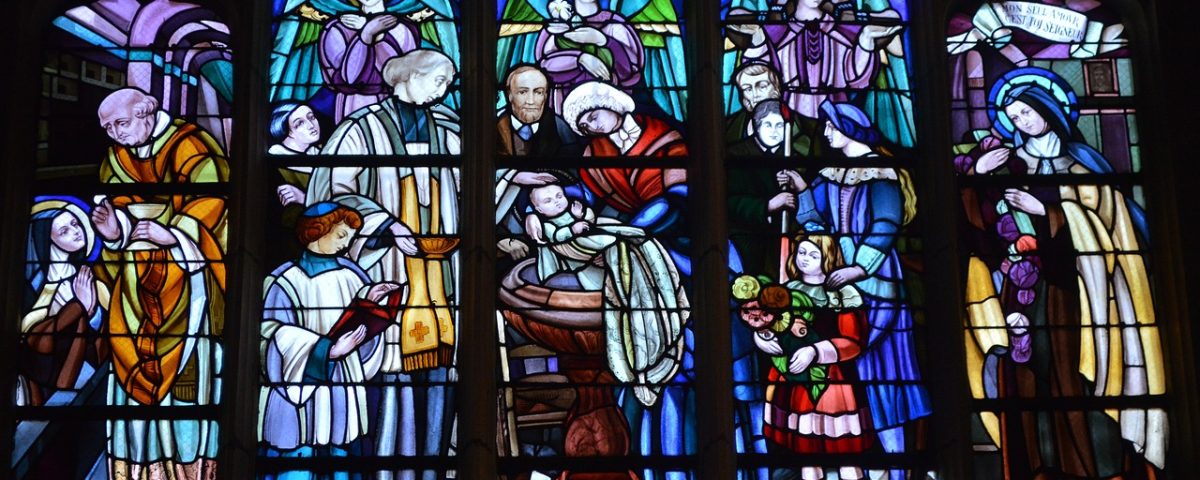If you step back to consider the whole—that is, the whole liturgical year—you will begin to understand what the Church is teaching us Sunday by Sunday.
It really only works if you’re paying attention Sunday by Sunday, of course. This is one of the reasons why the Church says you should go Mass each Sunday and not just when you can fit it in or just when you feel like it; because, as far as learning anything goes, as far as illumination goes, the results of partial participation will obviously only be partial—like enjoying only a couple of chapters out of a book or part of movie. I mean, you may get something out of it, but not what you could. Or worse, you may not get anything at all and not even understand why you don’t understand, which, when that happens, is a tragedy. But that’s another topic.
Back to the liturgy, what the liturgical year teaches us, what I mean is this: It’s interesting to me how the two great liturgical dramas of the year (that is, the dramas of Christmas and Easter) each end at a sacrament; that is, I’m fascinated how each liturgical drama comes to an intimate sacramental point. I mean, today is the Feast of the Baptism of the Lord. Now there is an argument to suggest that Candlemas on February 2 is the more traditional conclusion of the Church’s celebration of Christmas; but really, for the Church today it is today’s feast, the Baptism of the Lord, which brings the Christmas season to a close.
And that’s interesting, because it’s as if the Church is telling us how what we’ve just celebrated—that is, the birth of Christ—applies to us. Beginning in December, we’ve watched for the Lord, celebrated his birth among us, adored him in the Holy Family and adored him, along with the magi, as universal Lord; and now we celebrate his baptism—the baptism with we are baptized. That is, here is where the story of Christmas and Epiphany touches us, enters our lives, changes us—in the baptism we’ve all been given. You see what I mean? Christmas comes to us in the sacrament; that’s the point; that’s really the meaning of Christmas, Charlie Brown—not just kindness and good feelings, although it should mean that, but divine union. “[I]t is no longer I who live, but Christ who lives in me,” Paul said.[1] That’s the point of Christmas; that’s what happens in baptism; that’s what we celebrate today—how, by the sacrament, God comes close to us.
And the lesson is similar later in the year. After we celebrate the resurrection at Easter and then the ascension, notice what comes next: the descent of the Holy Spirit at Pentecost followed by the feast of the Holy Trinity followed by Corpus Christi, celebrating the gift of the Eucharist. Again, the liturgical drama comes to a sacramental point. Whereas at the Christmas and Epiphany we celebrate the incarnation and the universal significance of Jesus, which we encounter in baptism; at Pentecost we celebrate how the risen Lord remains present to us in the Spirit, all because the Spirit is also God, of the Trinity, which we consume in the Body and Blood of Christ, the most holy sacrament of the altar. Again, that’s the point of Easter; it’s sacramental just as the point of Christmas is sacramental.
Now, what’s the point of all this? I think it’s this: the way Catholicism works, the way it’s meant to work, is that it always leads us to the sacraments—that is, to an encounter with the Lord in the sacraments. And that’s because it is in the sacraments that God is truly found. That’s what the liturgical year is trying to do; Sunday by Sunday and season by season, the Church is luring us to God in the sacraments. That’s what I’ve been trying to point out.
But there’s more. The thing is: everything should lead us to the sacraments, absolutely everything. The way parents parent their children: we parents should live our lives in such a way that we lead our children into the life of the sacraments, which is why consistency and integrity matter so much. But also, the kind of friends we are to each other: are our friendships open to those deeper conversations about truth and God, maybe even prayer? Or are our friendships merely superficial? Now you don’t need to preach to your friends, but what I mean is: are you a friend who can open up about the real things of friendship—goodness, beauty, truth, God?
I don’t know, I could go on, but I don’t want to preach too long. Maybe I’ve made my point; I’m sure I could have said it better. It’s just I think there’s something to it—how everything we do should lead to God, who on this earth is sure to be found in the sacraments. I just think making the sacraments more central to your life will make a difference; I think it can change a person, maybe make a person happy or even holy. Maybe it’s right here in front of us, within reach. Maybe we just need to see it—to feel God in the touch of water, to taste him.
It’s interesting the way Luke puts it. Go back and read it closely. The picture Luke paints is of Jesus kind of mingling among the rest of the crowd that had been baptized along with him. Luke writes: “After all the people had been baptized and Jesus also had been baptized and was praying, heaven opened.”[2] What an interesting image: Jesus among us, mingling among us, praying, heaven opening. What if that’s exactly what I’m talking about? What if that’s what’s happening here? Wouldn’t that be an amazing thing to see, maybe to hear—that voice of love from heaven? Maybe you can hear it if you try. Amen.
[1] Galatians 2:20
[2] Luke 3:21
© 2025 Rev. Joshua J. Whitfield










